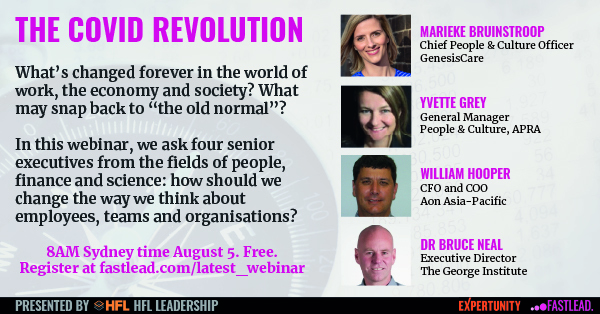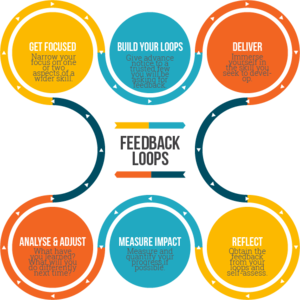In a webinar on 5th August 2020, we asked four senior executives from science, people and finance for their view on three questions.
-
Have the last four months changed work forever?
-
What’s never going to be the same?
-
What might return to “normal” look like?
What did they have to say?
We’ve summarised the key discussion points below, both the points made by panellists and the responses of forty participants contributing via chat. The responses have been arranged into five topics:
-
Have we arrived at the end of change?
-
What’s next?
-
What’s changed at work?
-
What does leadership look like in a time of crisis?
-
What has remote working meant for you?
Thanks again to our panellists
Marieke Bruinstroop, Chief People & Culture Officer, GenesisCare
Yvette Gray, General Manager, People & Culture, APRA
William Hooper, CFO and COO, Aon Asia Pacific
Dr Bruce Neal, Executive Director, The George Institute
Moderator: Alistair Gordon, CEO, HFL and Expertunity
Covid: what’s changed forever, and what will return to normal?
Have we reached the end of change?
-
We’ve arrived at a new normal and we’re not going back.
-
We’re nowhere near the end of COVID. We’ve got at least 12 months of outbreaks to go. One month it will be Melbourne, the next month, Sydney. Even South Australia will probably get hit eventually.
-
Many businesses today are on life support, they won’t survive. There will be huge consolidation, and entire sectors will disappear.
-
Digitalisation is now imperative. My 80-year old parents had never bought anything online four months ago, now they live in a digital world. There will be a “digital ice age” that digital dinosaurs won’t survive.
-
Middle management will need to be re-imagined. Remote and flex working are here for the long term.
-
The crisis has brought out perhaps some of the best and worst of human behaviour. It’s also given us access to different talent pools, and brought new voices to the table.
-
We probably haven’t seen the full impact on employees’ well being yet. There’s a lot of fatigue. Some people are thriving in the current environment, but many are “OK, what’s next?” They expected this to end by September.
-
We need to think about what’s coming next.
What’s next?
-
Don’t assume a vaccine will return us to normal – even if that comes along in a reasonable time frame, people have decided they want to live and work differently. People want more time at home with their families.
-
Remote working gives people more choice about where they work. But it also gives organisations choice about where they can source talent. There will be a dramatic shift in how we source and pay for talent as organisations face huge cash flow profit pressure in the next few years.
-
There’s a widening gap of rich vs poor, of technology haves versus have nots, and the concentration of online transactions versus bricks and mortar, and increasingly insular social bubbles as people interact less. Plus we’ll see increased economic volatility.
-
We need to consider the effect of wider social change. Will our children be the most significantly impacted in the long term? What does that mean for business and the future of work?
-
We also need to look at the casualisation of the work force and the impact this has had in the COVID-19 world. So many people have had no safety net, and no access to government benefits.
-
We’re going to need to spend a lot more on cybersecurity, people analytics, client analytics and training as we try to get our talent base used to operating in this new world.
What’s changed about work?
-
It’s become important to connect people to purpose. Organisations with stronger purpose, not just profit, are weathering the storm better than those that care only about profit. Profit isn’t the most important thing to people any more.
-
I see different views on the changes to working. Not everyone has benefited from remote working. Some people will always have to have kids with them at home. We need to create an environment where everyone can thrive on their talents, not just because they have a home office or the ability to not be interrupted while working from home.
-
We’re interacting so much more across borders, but we’re also connecting less within our own space. I’ve heard people say that they feel more connected with some people in the office that they hadn’t connected with before, but we had to be deliberate in creating those connections.
-
We used to spend a lot of time hopping on planes, holding hands – we can’t do that for the foreseeable future. That will change how we interact with partners. It forces us to divest more responsibility and have genuinely equal collaborations. There will be some initial narrowing of our horizons until we figure out how to do collaboration and partnership.
-
I look forward to seeing how technology will change how we support innovation. How do we replace accidental meetings, or the way some organisations used to put everyone in a room and not let them out until they had solved a problem? We don’t know the answer to this yet.
-
Many extrovert colleagues are keen to get back to the office whereas introverts are are saying “I love working from home. I get so much done”. How do we acknowledge these different ways of working when people return to the office?
What does leadership look like in a time of crisis?
-
Leaders don’t have all the answers. It’s important to acknowledge that and that you’re trying different things.
-
It’s important to give the latest information to people. We’re almost going at two speeds: inside the organisation, and outside the organisation, where people see unemployment on the rise, and who are asking what kind of work they’re going to do.
-
You have to be alert that employees are connected to broader networks. It’s not just themselves they worry about. They hear stories from others as well.
-
You’ve got to balance being positive and being realistic about the future.
-
People are now bringing their whole selves to work. If there’s no longer a divide between personal and private life with remote working, leaders will need to understand the whole person and lead people with greater care of that whole person
-
Evidence is becoming more important. Previously leadership culture was quite opinionated and experience-based. That’s not going to continue, but it’s a new skill set for some leaders.
-
Suddenly we’re seeing leadership skills come to the fore that we didn’t see before, like the ability to put energy into Zoom calls. Zoom is exhausting and you can’t feed off the energy in the room like you would in a face-to-face conversation.
-
The small stuff is very important. Now, I don’t spend nearly as much on flights or hotels. Maybe I should spend that money on small dinners each week with half a dozen people, rotating through senior and some junior staff. Maybe I should have small lunchtime meetings round the boardroom table where we used to seat 20. That has the potential to make a real difference, not just for me but also for the organisation.
-
You have to be careful if people are let go. Everyone worries about the people still in your business, but the people who leave have just as big an impact on your corporate brand.
Remote working and onboarding
-
“If I’d said a few months ago that 48 hours from now, we will all start working from home, you’d have thought I’d lost the plot”. And here we are.
-
People have missed connecting in person and the ability to be spontaneous with ideas. I think people will want to maximise their time in the presence of others, like workshops and physical collaboration.
-
At the same time, chat changes how people comment online. It’s a radical change because it gives a stage to those who were quiet in the past.
-
Today, work is what you do, not where you go - it can be done anywhere for most occupations.
-
Less face-to-face interaction is a real challenge for younger members of staff and new hires. How do they understand and join the culture? We need to push to more quickly reach a future where we can generate ideas and get social stimulation remotely. How do you ask everyone what they think – or push them to systemically look outside?
-
We had 30+ people join our organisation in the last few months, some of them from overseas. It’s a challenge: arriving in a new country, isolating for a few weeks, joining a new company where you’ve never actually seen the office. We’ve had to think: how do you create the experience? What experience do you want new staff to have? How do people connect to the organisation, how do we set them up for success?
-
With new staff in a remote world, you need to be more careful about who someone reports to.
Future webinars
Our latest webinar is always available here. Fill in the form below if you’d like to join the HFL/Fastlead mailing list and be invited to future webinars.




